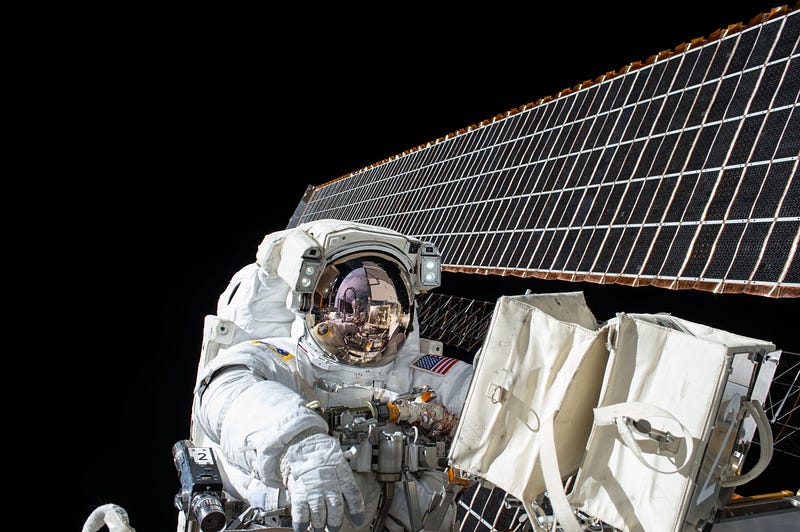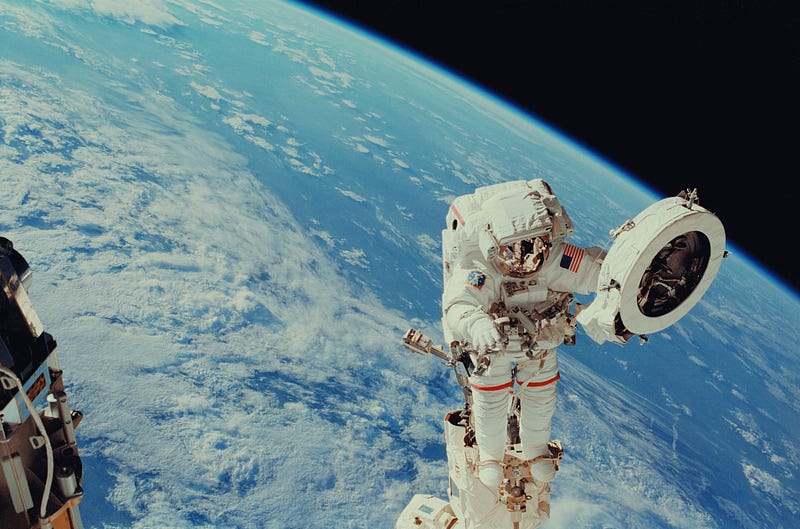Exploring Space: Fascinating Insights from a Sci-Fi Novelist
Written on
Chapter 1: The Allure of Space Research
As a sci-fi novelist, I find immense joy in delving into research about the cosmos. It’s captivating to explore its vastness, the silence of space, and the potential disasters that can occur beyond our planet. Here are some intriguing insights I’ve gathered during my literary explorations.

One particularly grim yet fascinating topic I encountered was the air purification systems used in spacecraft. While investigating the potential corrosiveness of certain chemicals on human skin, I stumbled upon some unsettling facts. The air filtration setup on stations like the International Space Station (ISS) is incredibly intricate. It incorporates layers of silica gel to absorb humidity, crucial for maintaining operational efficiency and breathable air. However, silica's effectiveness diminishes quickly, necessitating frequent replacements by astronauts.
Moreover, there are mechanisms in place to eliminate excess carbon dioxide and other harmful chemicals. For instance, sodium peroxide (Na2O2) serves as a disinfectant and purifier, typically appearing as a yellowish powder. While it’s combined with other substances to create a stable filter, its raw form is dangerously corrosive, capable of causing severe skin burns and respiratory damage, or even explosive reactions under certain conditions.
How is that for a writing prompt?
Section 1.1: Life on the ISS
In my quest to understand life aboard the ISS for my first novel, I discovered the challenges astronauts face daily. Crew members are elite professionals who undergo rigorous training for missions that can last around a year. Once in orbit, they experience weightlessness, which requires a complete restructuring of their daily routines.
For example, astronauts sleep in upright sleeping bags and consume specially prepared foods that minimize crumbs to prevent clogging the filtration systems. They also need to exercise regularly to counteract muscle and bone loss in microgravity. Occasionally, they partake in spacewalks, which involve donning a full spacesuit and tethering themselves to the station while floating in the vast darkness of space. Many astronauts cherish these moments, enjoying breathtaking views of Earth and the endless stars.

Section 1.2: The Dangers of Space Suit Malfunctions
For my second novel, a horror story, I was drawn to the consequences of a spacesuit breach. Contrary to the dramatic portrayals in many sci-fi films, the actual danger is known as decompression sickness, or "the bends." This occurs when a rapid drop in pressure allows nitrogen in the bloodstream to form bubbles, which can lead to severe physical consequences.
If a suit were to tear, this nitrogen expansion could result in dizziness, numbness, eardrum rupture, and, ultimately, death due to oxygen deprivation to the brain. This slow decline into the void is far more terrifying than the instant demise often depicted in movies.
Chapter 2: Discovering Life Beyond Earth
My research for the second novel also opened the door to the intriguing question of whether life exists beyond our planet. Surprisingly, findings suggest that microbial life may exist in our solar system, including in the outer atmosphere of Venus, where conditions might sustain these organisms.
Additionally, evidence of liquid water on Mars raises the possibility of small life forms surviving in its briny reservoirs, though further confirmation is still needed.
Bonus Fact: The Hottest Planet in the Solar System
Interestingly, the hottest planet isn’t Mercury, as many might assume. Instead, Venus holds that title due to its thick, toxic atmosphere composed mainly of carbon dioxide and sulfuric acid. Its days are longer than its years, leading to constant exposure to the sun’s heat.
Space is Cool
At the end of the day, the sheer wonder of space captivates me. Those distant points of light we see in the night sky are actually massive celestial bodies, often long extinguished, whose energy has traveled vast distances to reach us. We continuously ask ourselves why we should limit our existence to this single planet, prompting us to explore the vast unknown.
As we push the boundaries of our understanding and venture into the cosmos, I remain inspired to write about the adventures that await us beyond Earth. The possibilities are endless, and that, to me, is incredibly exciting.
A humorous exploration of space and mental health, blending interesting facts with fiction.
An in-depth look at the science fiction genre, discussing its key elements and notable authors.